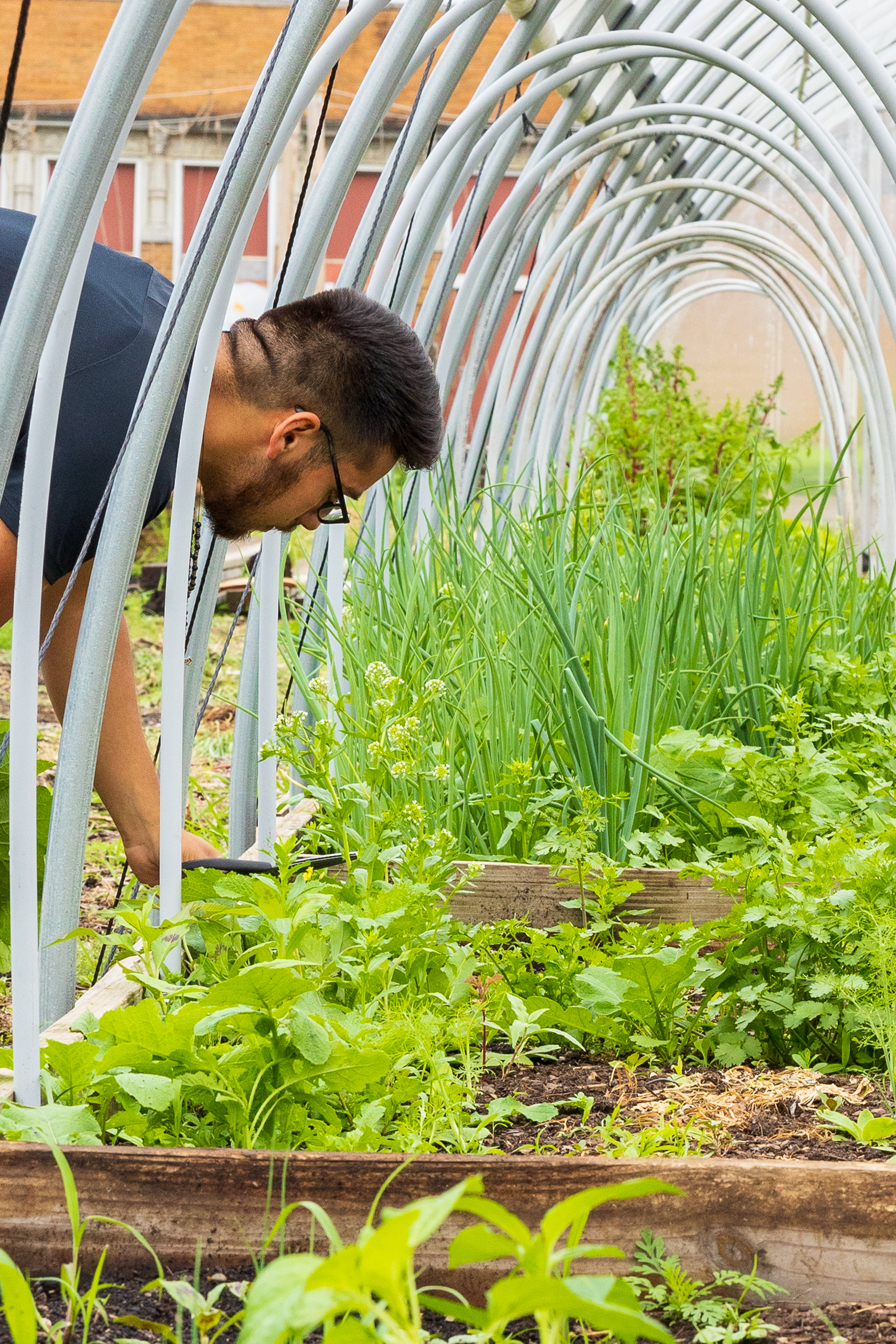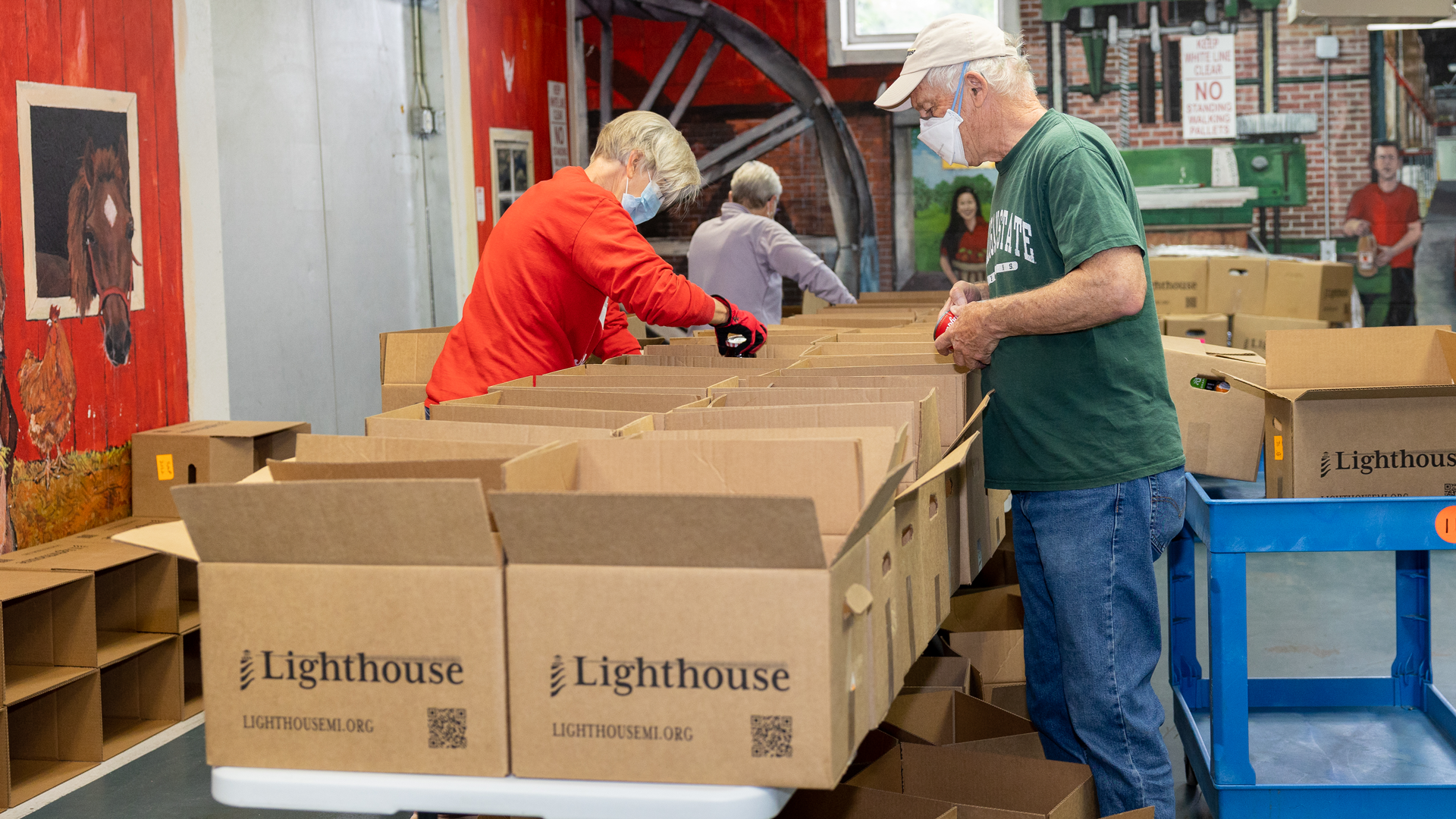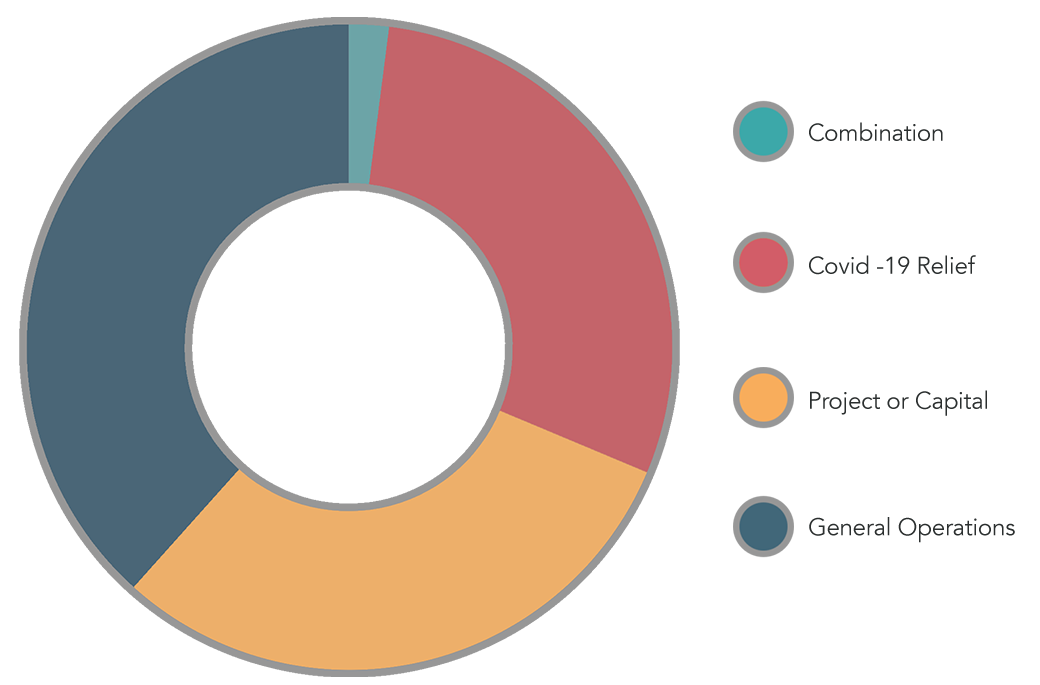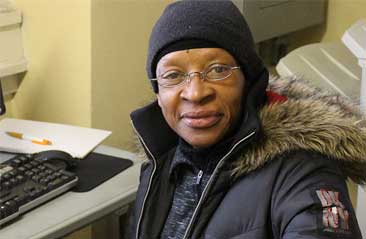2020-21 biennial report
2020-21 biennial report
Joining the Work of Justice
Keep Growing Detroit
Joining the
Work of Justice
Keep Growing Detroit
In a time of crisis and change, we are listening with humility, centering racial equity and evolving our support for our neighbors.

Our Journey Towards Just Funding
Kate Levin Markel
President, McGregor Fund

Dear friends, dear community,
With this biennial report, we are attempting to convey two years of enormous effort, adaptation, learning, loss, and regeneration – for the McGregor Fund and for our partners. Like many of you, we find ourselves deeply changed by the experience of the pandemic. As you’ll read in pieces from our out-going chairperson, Rick Rogers, and from my colleagues Heidi Alcock and Vanessa Samuelson, we hope we are better for it.
The pandemic affirmed and amplified some tenets of our work and culture. Our valued relationships with providers who work holistically with their clients and participants provided pathways for supporting individuals and families with direct aid, as these grant partners extended their reach into the community at a time of crisis. Our longstanding practice of trusting partners with unrestricted support paved the way for rapidly granting highly flexible dollars for partners to use quickly at their discretion. And our deep commitment to learning positioned us to see and support emerging needs and opportunities in real time.
We also saw clearly that we needed to acknowledge structural racism as the primary driver of Detroit’s high concentrated poverty, and to prioritize racial equity and justice as key to its elimination. In our anti-racism statement, we made commitments for which we can now be held accountable. We opened up new conversations with our partners, many of whom envision and pursue a more just world every day. They give us deeper purpose and inspire us to live up to their example. We accepted that we have a role in supporting grassroots leaders and organizations that fill gaps in the social safety net; and we’ve begun to hand over resources and decision-making to community tables to identify and support those organizations on our behalf. This brought us to question how else people who are closest to the work might inform and guide us. (More on that to come.) We’ve seen more clearly the burdens that leaders of color uniquely bear – both professionally and personally. This has challenged us to find ways to support their leadership and well-being.
Despite extreme challenges, our partners have done affirming and herculean work these past two years. They have also emerged with new insights, services, and projects underway. And after years of building capacity, they are securing new funding to grow and evolve. I encourage you to dig into the stories and organizations on our website.
Finally, I’m proud of how our entire board and staff worked together and accomplished what the times required of us. Special thanks are owed to Rick Rogers, who retired from the board in December. As chairperson, Rick stepped up to the unexpected demands of the times and led thoughtfully and inclusively. I am especially grateful to have had his full support and wise guidance.
All of us at the Fund have renewed appreciation for the privilege and responsibility we hold and are excited about the work ahead. I hope you’ll let me know how we’re doing and what we’re missing – I’d love to hear from you.
A Time of Crisis and Adaptation
Richard L. Rogers
Board Chair Emeritus

Serving as a Trustee of the McGregor Fund is a great privilege. In guiding and supporting the work of a highly talented and expert staff, the board has the opportunity to learn deeply about the challenges faced by the most vulnerable members of our community. We are regularly inspired by the many organizations dedicated to addressing those challenges and creating a more caring and equitable society. We are continually heartened and humbled by the many selfless individuals who make those organizations effective. We have come to understand more about the systems within which these organizations function, where they succeed, where they need improvement, and how the Fund can help strengthen them. We strive to reflect the values that animated the Fund’s founders, Tracy and Katherine McGregor, and ensure that the mission they gave the Fund – to relieve the misfortunes and promote the well-being of humankind – adapts to meet the most pressing needs of our time.
Adaptation was critical in the last two years as our community faced crises brought on by national and global events. The pandemic had a particularly severe impact on the people served by McGregor’s grantee partners. The murder of George Floyd and other racially motivated crimes by law enforcement authorities and ordinary citizens raised a painful awareness of how persistent the effects of racism still are in our society. Like many of our colleague foundations, we felt these events required an unusual response.
So the Fund changed the way it typically works. To get financial resources quickly to organizations responding to what was truly an emergency, we increased our grants budget, simplified the grant application process, loosened grant restrictions, and accelerated payments. We made grants to organizations the Fund had not previously supported but that were on the front lines of the pandemic fight. To expedite decision-making, the board began meeting bi-weekly, and this continued for several months. While we have returned to a more usual meeting cadence, the changes in the grant-making process remain; and we will continue to improve the process to make it more responsive to our grantees.
The resurgent focus on racial justice in our nation also led to changes at the Fund. We issued a statement in spring 2020, signed by all Trustees and staff, condemning racism. Because words of moral indignation require action, we made a series of commitments in the statement about how a focus on racial equity and justice will influence our work going forward. We intend to fulfill those commitments and have begun doing so by scrutinizing our attitudes, priorities and processes through a racial lens, by having greater dialogue with our grantee partners, and by seeking out new grantee partners whose missions directly advance racial equity and justice. These efforts will continue and will shape the Fund’s work in the future.
The main reason we are able to engage in this kind of self-examination and renewal is the collegial relationships shared among our small board and staff. The board is so grateful to our President, Kate Levin Markel, and the staff for the ways in which they live and actualize the mission and for their heightened initiative during the crisis. The board’s efforts were greatly enhanced by the addition of four colleagues who brought new experiences and perspectives to our discussions: Michelle Johnson Tidjani, Kristi D. Plain, and Dr. Felix M. Valbuena. We welcomed back Sheilah P. Clay after her two-year hiatus working in the city administration. We sadly said farewell to William W. Shelden who retired from the board after nearly 20 years of service and who provided steadfast, wise stewardship of the Fund’s endowment in his 18 years as chair of the Investment Committee. We thank Bill warmly for his contributions. Finally, and above all, the board is grateful to the Fund’s grantee partners who relieve misfortune and promote well-being every day.
Reflections on Learning
Vanessa L. Samuelson
Director of Learning & Reporting
McGregor Fund

In this biennial report, we are pleased to share some of what we have learned from our partners and peers over the last two years that continues to shape our work today.
We began 2020 with a strategy focused on housing and employment as critical paths out of poverty. The strategy explored the role a private, independent foundation like the Fund can play in improving the systems and practices that serve people most disconnected from housing and employment – people experiencing homelessness and chronic unemployment.
Nine months into the strategy, the COVID-19 pandemic arrived and we saw, in real time, the disproportionate impact of illness and death on communities of color. We immediately offered maximum flexibility for many active grants, reduced reporting requirements, and began new emergency grantmaking procedures, quickly diversifying our portfolio to include grassroots and network-based efforts as part of the safety net response.
In the months following the onset of the pandemic, we witnessed the murders of George Floyd and Breonna Taylor and the national uprisings that followed. We issued a statement committed to anti-racism in the summer of 2020.
Throughout 2020 and 2021, we were learning from our strategy, the pandemic, and new areas of learning that opened up based on our anti-racism commitment. We closed out 2021 understanding that:
- Structural racism is why Black people and other people of color experience homelessness and chronic unemployment at disproportionately higher rates than white people. Our strategic priorities were not developed with structural racism as a premise and were thus insufficient.
- It is essential for us to join local and national leaders in seeing causes and solutions through a racial equity and justice lens for our work to be more effective and impact more people at the heart of our mission. Nationally, efforts to address homelessness and unemployment increasingly center racial equity and justice. Locally, leadership abounds in seeing causes and solutions through a racial equity and justice lens.
- Supporting the well-being of people need not come after meeting their emergency or basic needs. They can go hand-in-hand; we can affirm the dignity and agency of each person and also address the emergency they are experiencing in the moment. Our COVID-19 relief grants to grassroots and network-based organizations showed us how this is possible through relationships and community.
- Centering people with lived experience is aligned with equity and justice principles. It is an intentional way of working that shares organizational and program design and decision-making with people who have experienced the conditions that programs and services are intended to address. It extends far beyond customer satisfaction or feedback. We have observed how our grant partners weave this commitment through the fabric of their organizations, from hiring staff, to governance, policies, budgeting, to how they identify and plan for future work. Flexible funding is key to their ability to work in this way.
- When we create solutions based on the experience of people rather than on programs and services, the necessity of cross-system, cross-sector partnerships becomes immediately visible. We collectively lack person-centered, cross-system data that illuminates how and for whom systems should be formally collaborating. Without this data, we leave on the table money and opportunity to work more effectively for people experiencing poverty. Here are a couple of examples from Detroit and Washington State that have spurred action in youth homelessness.
Bringing this knowledge into 2022, we began to ask our grant partners and funding peers about how racial equity, justice, and people with lived experience are part of how they work. What they have shared is helping us advance our own learning and grantmaking practices by intentionally centering community and orienting to community-created visions that align with principles of racial equity and justice.
By the next biennial report, we look forward to sharing how we have used our learning to make progress in fulfilling our commitment to anti-racism and continued to contribute to ending homelessness and chronic unemployment in Detroit. If you have questions, reflections, or would like to talk with us about this, please reach out to us. We welcome it.
How Our Grantmaking Shifted
Heidi A. Alcock
Director of Grant Development & Communications
McGregor Fund

Someone close to me once said, “Thank you is not enough.”
As the McGregor Fund’s Director of Grant Development & Communications, I was in conversations daily with our community in 2020-21, during the height of the pandemic, and I am still in awe over what we have been through and how hard so many worked to keep one another safe. Our grantees did the impossible, day after day, in the face of grave risks and unthinkable sacrifice and losses, and “thank you” is simply not enough.
Social service agencies historically supported by the Fund were already overstretched, yet overnight faced skyrocketing demand for food, PPE, housing, connection to new and changing public benefits, and other emergency needs. They went to heroic lengths to do more. Many operated in person, defying serious risks, to be on the frontline effort, keeping our community safe and delivering relief and care. They showed us what personal sacrifice looks like.
Community-based leaders, mostly BIPOC and often off the radar of funders, did what only they can do. They quickly mobilized neighbors, gathered donations of food and other necessities, and went door to door to make sure every resident was ok and had what they needed, especially seniors and the medically vulnerable, but also homebound families who faced myriad daunting challenges. They delivered food and PPE, prescription medications, diapers and formula, laptops for learners, and genuine compassion and concern and care and hope. They reminded us in the most powerful way that we all belong to each other.
Overnight, our grantees, big and small, became public health experts, reviewing and making continuous operational adaptations to implement ever-evolving State of Michigan and CDC guidelines around social distancing, PPE, and quarantining. Our grantees focused on others, even as the virus spread and harmed the very communities they were working to protect, as well as their own co-workers and families. No amount of hard work, sleepless nights, good planning or rigorous mitigation prevented heart-wrenching loss and profound, prolonged fear.
And then, in the months following the onset of the pandemic, we witnessed the murders of George Floyd and Breonna Taylor and the national uprisings that followed. We cried together, we raged together, we marched together, and all the statements and commitments made could not quell the lasting emotional impact of the images and sounds and feelings and realities shown in that moment and held in our minds and bodies forever. When will there be justice, when will there be peace for Black people in our country?
The 2020-21 biennial period forever changed the McGregor Fund. As part of its COVID-19 emergency response, 28 new partners were welcomed into our grantmaking. Our new grantees are BIPOC-led, and add more community-based, faith-based, network-based, and re-granting organizations to our portfolio of high-quality established service providers. Through the addition of their work, we are all learning the necessity of cultural humility and the importance of centering racial equity and lived expertise.
Our grantees, old and new, are showing us what it looks like to pursue racial justice; it looks like our community, literally. It is more Black, Brown, immigrant, LGBTQ+, inter-generational, female, and inter-faith. It is less white, less institutional. It is our community – and a consistent practice and culture of care and listening and trust – on the boards of directors, in leadership positions, on the frontlines, and everywhere that decisions are made. People, our community, know themselves best, and we at the McGregor Fund will continue to listen deeply, trust completely, and make the shifts needed to be accountable to you.
“Thank you” grantee partners, for showing us the way.
2020-21
Grantmaking
2020-21 Grantmaking
Keep Growing Detroit
McGregor Fund grantmaking included both our strategic priorities of ending homelessness and chronic unemployment and our response to the ongoing pandemic, reaching new grant partners and increasing the number of grants made.
$13,943,080
$104,835
133
28
$13,943,080
$104,835
133
28

In 2020-21, the Fund reached new grant partners and increased the number of grants made by: 55%
Grants by Priority

Basic Needs
Food, shelter and other necessities essential for day-to-day living
33 Grants
SkillBuilding
Programs to develop identity, readiness and relationship networks
25 Grants
Recovery & Restoration
Domestic abuse, addiction, trafficking and other desolating conditions
20 Grants
Covid 19 Relief
Our evolving grantmaking expands support options, incorporates respectful learning and extends flexibility to community partners best positioned to respond to the compounding hardships caused by the COVID-19 pandemic and its aftermath.
39 Grants
Foundation Directed
The Fund also directs grant support to strengthen the nonprofit sector, address discrete citywide and regional opportunities and challenges, and honor our founders’ legacy. Applications are not solicited for these grants.
12 Grants
Grants by Priority

COVID-19 relief for organizations responding to or significantly impacted by the pandemic crisis totaled: $1.85m

GRANTS BY TYPE

Combination
2%
Covid-19 Relief
29%
Project or Capital
30%
General Operations
38%




